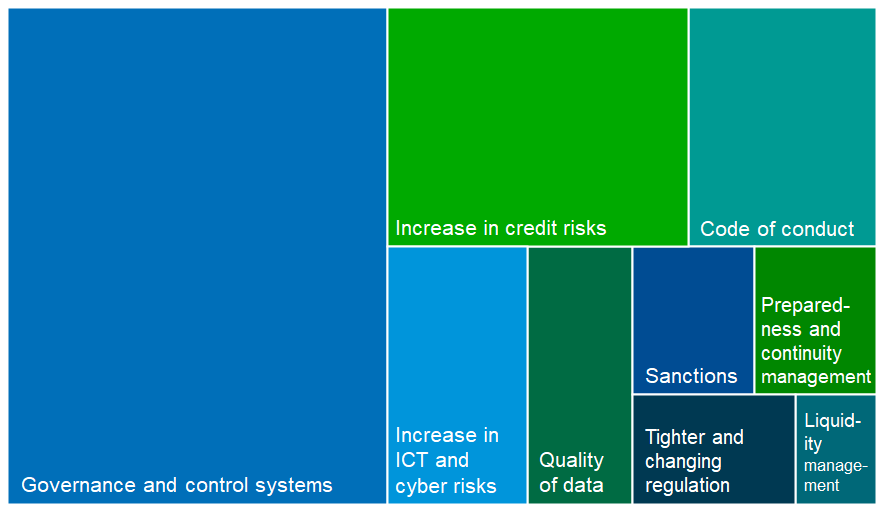Financial Supervisory Authority will focus in 2024 on risk resilience of supervised entities in a changing operating environment and on soundness of governance
Changes in the operating environment resulting from economic uncertainties, cyber security risks and enhanced regulation underline the importance of capital adequacy, liquidity and sound governance. In 2024, the Financial Supervisory Authority’s supervision and inspections as well as thematic assessments and analyses will focus on these themes.
In January 2023, the Financial Supervisory Authority (FIN-FSA) published, as a supervision release, its full-year assessment and inspection plan for the first time.
The plan for 2023 was implemented fairly comprehensively. Some inspections were cancelled due to, for example, changes in the supervised entity’s situation or the reallocation of supervisory resources.
-Our objective is to be a proactive and predictable supervisor, in line with our strategy. We will enhance predictability by, for example, communicating our supervisory plans so that our supervised entities know what we consider to be important at any given time. We also aim to be flexible and ready to review supervisory priorities, if necessary, throughout the year, says Tero Kurenmaa, Director General of the FIN-FSA.
The FIN-FSA’s supervisory priorities in 2024 relate to operational and financial risks in the uncertain operating environment, long-term trends and soundness of supervised entities’ governance.
As regards sound governance, the focus will be on governance and control systems, the risks and management of outsourcing and the quality of data. Findings in code-of-conduct supervision are also increasing in Finland, and they are often a sign of a functioning governance and control system. As regards operational risks, the focus will be on, for example, compliance with and supervision of sanctions as well as preparedness and continuity management. Of financial risks, the focus will be on vulnerability of capital markets to shocks, valuation of illiquid assets, increase in credit risks and challenges in liquidity management. Of the long-term trends in the operating environment, supervision will focus on ESG risks, the increase in ICT and cyber risks, financial sector digitalisation as well as tighter and changing regulation.
Quantitative distribution of thematic assessments and inspections in the supervisory priorities

Inspections and thematic assessments in the various supervisory sectors
The FIN-FSA’s supervisory work includes inspections and thematic assessments. The annual plans for inspections and thematic assessments are prepared in accordance with the supervisory priorities, but also considering other factors, such as the priorities of European supervisors and the risk-based approach, to cover the various groups of supervised entities and supervisory themes.
The priorities of the ECB’s banking supervision in 2024 are resilience to immediate shocks, more effective governance and the management of climate and environmental risks, digitalisation and operational resilience. Of Finnish banks, Nordea, OP Financial Group and Municipality Finance are under direct ECB supervision, but the FIN-FSA conducts the supervision in Finland, in cooperation with the ECB. The FIN-FSA will also follow the same priorities in the supervision of smaller credit institutions under direct FIN-FSA supervision. In the supervision of banks, the FIN-FSA will also assess the soundness of governance, compliance with sanctions, credit and liquidity risk, management of ICT risks and contingency arrangements.
A new area of inspection in 2024 will be crypto-asset companies’ customer due diligence procedures as, in risk assessments of anti-money laundering and counter-terrorist financing, the total risk exposure of these entities is considered to be significant.
In early 2024, the FIN-FSA will conduct a thematic assessment of the real estate investments of insurance institutions. Supervision will also pay particular attention to illiquid investments and their valuation and risks. In the supervision of pension providers, the FIN-FSA will assess, for example, adequacy of risk management, conflicts of interests and marketing of expense loading components. In the supervision of non-life and life insurance companies, the FIN-FSA will continue to conduct inspections of governance and technical provisions, with rotating coverage.
Supervision of unemployment funds will also focus, in particular, on the soundness of governance. In code-of-conduct supervision, the FIN-FSA will inspect, for example, the activities of car dealers and vehicle inspection offices as part-time insurance agents.
The FIN-FSA will assess in 2024, together with the European Securities Markets Authority (ESMA) and the other national supervisory authorities, investment firms’ compliance with code-of-conduct obligations concerning sustainability data as well as the risk management methods of companies’ trading systems.
Inspections and thematic assessments of capital market entities will focus on governance and control systems, outsourcing and quality of data.
In 2024, the FIN-FSA will supervise listed companies’ compliance with the disclosure obligation as regards, for example, the obligation to disclose and manage inside information. Supervision will also be targeted at listed companies’ IFRS financial statements.
Assessments and inspections will be reprioritised as necessary, if so required by changes in the operating environment.
The FIN-FSA communicates thematic assessments directed at broader groups of supervised entities on a general level in the form of supervision or press releases. The FIN-FSA may launch more detailed investigations on the basis of the findings of thematic assessments and inspections or take other supervisory measures.
See also:
- Assessment and inspection plan 2024
- FIN-FSA supervisory release 25 January 2023: Supervision focuses on economic uncertainty, cyber security and longterm changes in the operating environment
- ECB Banking Supervision press release 19 December 2023: ECB keeps capital requirements steady in 2024, refocuses supervisory priorities (europa.eu)